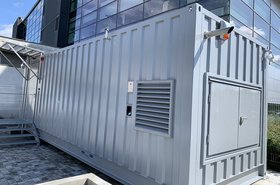Cities and regions across Europe are queuing up to host the European Union’s “gigafactory” AI data centers.
Austrian capital Vienna, Prague in the Czechia, and Spanish town Mora la Nova, have all submitted bids, while projects at unspecified locations in Germany and the Netherlands are also in the running, with all the projects submitting expressions of interest ahead of last Friday’s deadline.
The EU gigafactories project, announced in February, will see three to five supercomputing clusters built across the continent, each equipped with 100,000 AI chips for training the latest and most complex models. Further technical specifications have not been disclosed.
The gigafactories will be financed through InvestAI, an initiative to mobilize €200 billion ($209bn) for investment in AI, including a new EU fund of €20bn ($20.9bn) specifically for the gigafactories.
A decision on where the data centers will be located is expected later this year, with a view to operations beginning in 2028.
Oh, Vienna
Vienna believes it has a strong case to host one of the facilities, and the city council said it will work with power company Wien Energie to ensure all waste heat generated at the data center is funneled into Vienna’s district heating system.
Local and national politicians came together on Friday to formally sign the city’s application for a gigafactory.
“By applying for a European AI Gigafactory in Austria, we are demonstrating that we are ready to assume responsibility for Europe’s digital future,” said Austrian Chancellor Christian Stocker.
“Such projects are important because they not only contribute to strengthening our location, but also further expand our technological competitiveness. For a sustainable economic recovery, it will be crucial to focus specifically on areas where future technologies and location policy interact meaningfully.”
Austria is already home to several supercomputers, most of which are based at the nation’s universities. These include Musica, based at the Graz University of Technology, which is scheduled to come online this year.
Vienna’s mayor, Michael Ludwig, said: “Vienna enjoys an excellent global reputation for its efficient infrastructure, high quality of life, and innovative strength. An AI Gigafactory would ideally complement the existing network and further strengthen our business location. We stand for technological excellence, consistent climate policy, and strong social cohesion.
“Together with the federal government and committed companies, we are bringing these strengths to the application, thus positioning Vienna as a responsible, competitive location for artificial intelligence in Europe.”
Czech it out
In Czechia, the nation’s Ministry of Industry and Trade wants to build a gigafactory in Prague’s Zbraslav district on land owned by telco Czech Radiocommunications (CRA).
CRA was planning a 26MW data center in Zbraslav, but could now instead use the land to develop a gigafactory if the application is successful. The company would be one of several investors in the project, and would operate the data center.
Its power allocation could be increased by an additional 77MW if the gigafactory gets the go-ahead, according to a report in Prague Morning.
“We’ve already prepared a project called Prague Gateway DC, one of the most modern and largest data centers in the region,” said Anna Tůmová, CRA spokesperson. “That’s why CRA is logically involved in this AI gigafactory initiative.”
Spain plans gigafactory gain
Another telco, Telefonica, is spearheading the Spanish bid for a gigafactory. Spain’s government has decided that the data center would be located in Mora la Nova, near Tarragona in the Catalonia region.
The gigafactory initiative has been led by Telefónica, working with Spain’s Economic Office, along with the Ministry of Digital Transformation and Civil Service, and the Catalan government.
Industry members of the consortium include ACS, MasOrange, Nvidia, Submer, Multiverse Computing, and the Spanish Society for Technological Transformation, as well as Telefonica.
Spain is already home to one of Europe’s most powerful supercomputers, the MareNostrum 5, which is housed at the Barcelona Supercomputing Center.
Germany and Netherlands ready to bid
Meanwhile, German infrastructure technology company Hochtief has announced it is working with cloud provider Ionos on a gigafactory bid.
The location for the data center has not been disclosed, but the companies said they would form a consortium of “specialized technology, utility and security companies as well as renowned research and development institutions.”
In the Netherlands, a group known as AI Gigafactory.NL has expressed an interest in hosting one of the data centers.
Again, the location is not disclosed, but the organization’s website lists a host of high-profile partners from industry and academia.
Writing on LinkedIn, Han de Groot, who is leading the project, said it is supported by Peter Wennink, the former CEO of Dutch firm ASML, which makes advanced lithography machines for the chip industry.
“We are in the race,” de Groot declared.
Read the orginal article: https://www.datacenterdynamics.com/en/news/cities-across-europe-line-up-to-host-eus-ai-gigafactories/








